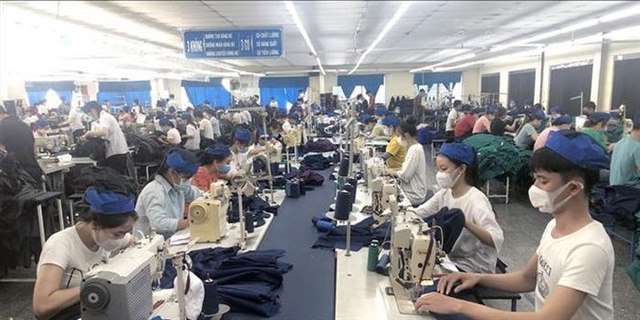Viet Nam needs to start an economic recovery programme soon to achieve the economic growth target of 6-6.5 per cent in 2022 as set by the National Assembly, experts have said.

Viet Nam needs to start an economic recovery programme soon to achieve the economic growth target of 6-6.5 per cent in 2022 as set by the National Assembly, experts have said.
The National Assembly is expected to hold a meeting next week to discuss urgent issues, including the fiscal and monetary policy programme for economic recovery in 2022-23 as submitted by the Government.
According to Minister of Planning and Investment Nguyen Chi Dung, the Government has issued many policies and solutions to support enterprises in restoring economic development and promoting economic growth. However, most were short-term and not comprehensive.
Therefore, the most important purpose of the programme for the next two years is economic recovery associated with improving internal capacity and competitiveness, structural reform and resilience of the domestic economy.
Deputy Minister of Planning and Investment Tran Quoc Phuong said there were five groups of solutions in the economic development recovery programme for 2022-2023.
They include pandemic prevention and medical work; social security; enterprise support; promoting public investment; and State management.
Dr. Vo Tri Thanh, director of the Institute for Brand Strategy and Competitiveness, said the economic stimulus and support packages and the programme of economic recovery and development should be strong enough to fulfil the objectives.
The Government is considering a support package of up to 10 per cent of GDP. However, it needs to be able to manage risks from policies.
If this programme is well implemented, economic growth could increase by 1-1.5 percentage points, according to experts.
Although there is no sign of decreasing COVID-19 cases nationwide, with vaccination, flexible adaptation strategies and effective control of the pandemic, the domestic economy has remained stable during the prolonged social distancing period.
It is important that the Government's strategies have consolidated the trust of people and the business community in fighting the pandemic and maintaining production and business activities.
Prime Minister Pham Minh Chinh has affirmed that Viet Nam's difficulties are only momentary. Viet Nam still has potential for long-term development, and the macro-economy remains stable.
To have solid development in the macro-economy, Viet Nam has issued policies to promptly support people and businesses affected by COVID-19.
These have included exemption and reduction of taxes, fees, charges; delays for tax payments; and rescheduled payment of debts as well as exemption or reduction of interest rates.
Employees and employers have also received loans from the Unemployment Insurance Fund.
Besides that, the enterprises with bad debts are permitted to get loans with zero interest rate to pay wages for employees affected by COVID-19.
Meanwhile, the Ministry of Finance has proposed reducing 35 fees and charges from January 1, 2022 to June 30, 2022 to remove difficulties caused by COVID-19.
This proposal includes prolonging the support period and cutting five more fees compared to the Circular from last year.
With timely supportive policies and flexible strategies, Viet Nam's economic growth in 2021 reached 2.58 per cent, despite the serious impact of the pandemic.
The agricultural sector’s GDP is expected to grow by 2.8 per cent, continuing to be the backbone of the domestic economy with a large contribution to national export value.
Although exports were affected by supply chain disruptions due to the pandemic, the country's trade value was expected to reach over US$660 billion in 2021. Viet Nam's trade surplus was estimated to be US$2.1 billion this year, with Viet Nam achieving a trade surplus for six consecutive years.
This year, foreign direct investment was predicted to reach over US$29 billion, an increase of more than US$500 million per year. This shows foreign investor confidence in Viet Nam’s economy.
Viet Nam’s socio-economic development has recovered since October because the pandemic has been basically controlled and the economy has been gradually restored.
In the first 10 months, newly registered FDI capital increased by 11.6 per cent and exports surged by 16.6 per cent year-on-year.
The number of newly established enterprises in October increased by 111 per cent compared to September with a registered capital increase of 74 per cent.
Total demand recovered strongly and total retail sales of consumer goods and services increased by over 18 per cent.
However, there are still limitations affecting economic growth this year. The disbursement of public investment capital was slow in the first 11 months to reach 64 per cent of the plan.
Besides the pandemic, there were still inherent causes, such as poor project preparation, problems in site clearance and limited capacity of the management board and contractors.
In addition, according to Minister Dung, the implementation of policy packages was still slow in some localities so people and enterprises have not received timely support, reducing its effectiveness.
Many localities have rigidly implemented regulations on pandemic prevention and control, which has broken the supply chain for agricultural produce, greatly affecting production and business activities.
In 2021, Viet Nam was most severely affected by the fourth COVID-19 outbreak from the end of April and July. It hit major provinces, cities, and key economic regions.
A series of leading provinces and cities in terms of industrial production and budget revenue had to implement social distancing measures for many months, such as Ha Noi, HCM City, Da Nang, Can Tho, Bac Ninh, Bac Giang, Binh Duong and Dong Nai.
HCM City had only 2,000 enterprises in operation during social distancing, accounting for 0.7 per cent of enterprises in the city.
The social distancing measures caused production to stall, supply chains to break and purchasing power to plummet.
In the third quarter of 2021, the pandemic caused economic fallout with national GDP contracting by 6.2 per cent, the biggest drop since Viet Nam began publishing its quarterly GDP.
Overall, GDP in the first nine months of 2021 increased by 1.4 per cent. — VNS





